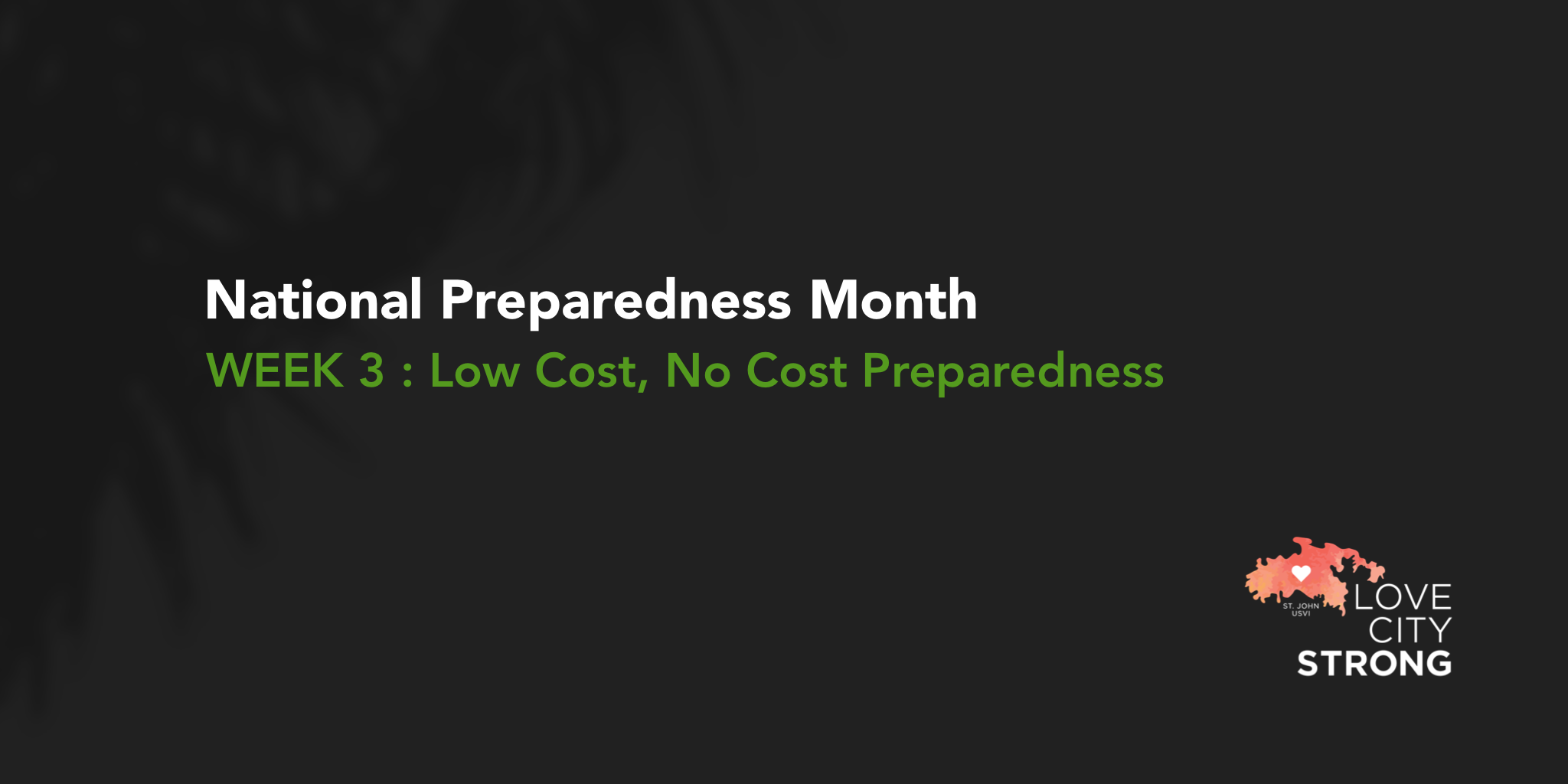
September is National Hurricane Preparedness Month, and this year’s theme is “Prepare to Protect. Preparing for disasters is protecting everyone you love.”
Every week in September, we will be sharing information demonstrating how individual and household preparedness can make a difference in your community. This week’s topic is: Low Cost, No Cost Preparedness.
Disaster preparedness can feel like a massive burden. By taking the time to prepare all-year round rather than right before a disaster strikes or during the time of year when disasters regularly occur in your community (such as hurricane or wildfire season), you can lessen the impact on your time and your wallet.
Beginning in January, do one or two preparedness activities every month. Make a list of everything that your household needs to do, and stick to a regular schedule. This will help make preparedness a regular part of your household’s routine, and alleviate the anxiety and stress surrounding preparedness right before an event. It also allows you to budget preparedness ahead of time.
There are numerous actions you can take year-round to prepare that are low or no cost. These include:
- Set aside at least $10 a week in cash, and put it into an envelope in your emergency kit.
- Purchase one or two items per month to complete your emergency kit.
- Make physical or digital copies of your important documents (such as IDs, birth certificates, health records, insurance records, home ownership records, etc.).
- Make a list of items on porches or outside of your home that need to be brought inside or secured before a disaster, and create a step by step plan to address them.
- Keep your gutters regularly cleaned and secured.
- Trim branches and clean up garbage around your property to prevent it from becoming projectiles in a wind-based disaster (such as a hurricane or tropical storm).
- Contact churches or nonprofits in your area, and ask what preparedness resources they provide both before and after a disaster so that you know where you can go for services.
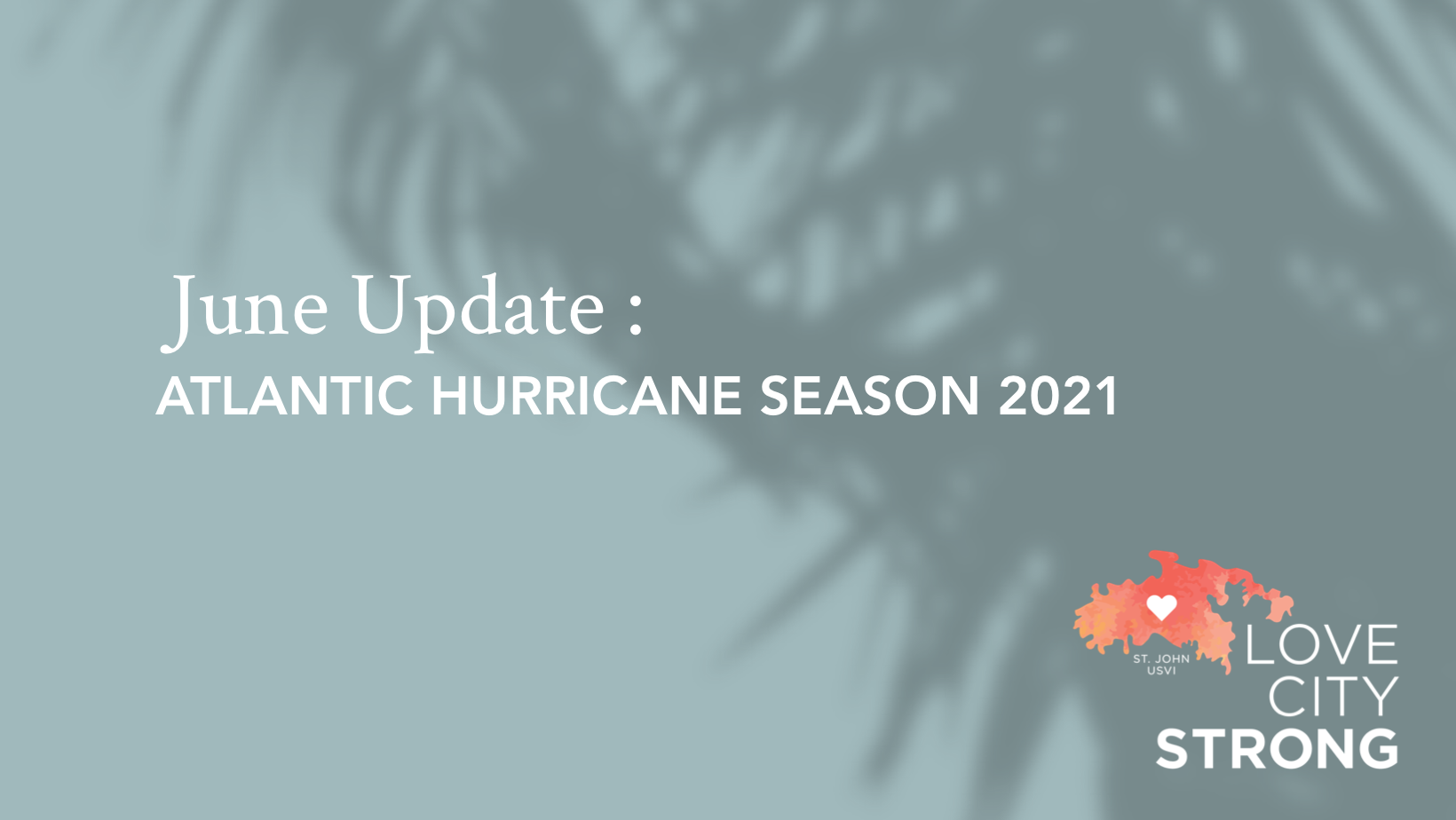
As the first month of hurricane season ends, we find ourselves watching an increasingly active Atlantic. Tropical Storm Danny made landfall yesterday in South Carolina as the fourth named storm of the year. Presently, Invests 95L and 97L are approaching the Caribbean with the potential for development. For the sixth year in a row, experts have forecasted an “above average” hurricane season, but as we well know, all it takes is one storm to change everything for your community.
Preparedness, on an individual and community level, is critical to managing the immediate impact of a disaster on your life. Furthermore, a higher level of preparedness can help you, your family, and your community navigate your recovery from a disaster impact more smoothly. Making a plan, gathering important documents, and explicitly sharing your plan will help in the short term. These steps will also, notably, help in the long term.
Community itself is also essential to preparedness. In other words, strong relationships with your neighbors, church, and local businesses make you more resilient. Now is the time to check in with your neighbors and find out what they may need. Identify members of your congregation who may need extra support in times of crisis. Include your employer or employees in your emergency planning process. Communities with strong ties fare better in the wake of disasters.
The Atlantic hurricane season is already quite active, and will only continue to heat up between now and October. Consequently, it is important to undertake preparedness efforts as soon as possible. Make sure you identify any unmet needs or gaps in your plans, and take the necessary actions. For up to date, reliable forecasts, visit the National Hurricane Center website. For VI specific alerts, watches, and warnings, visit VITEMA’s website, or sign up for AlertVI.
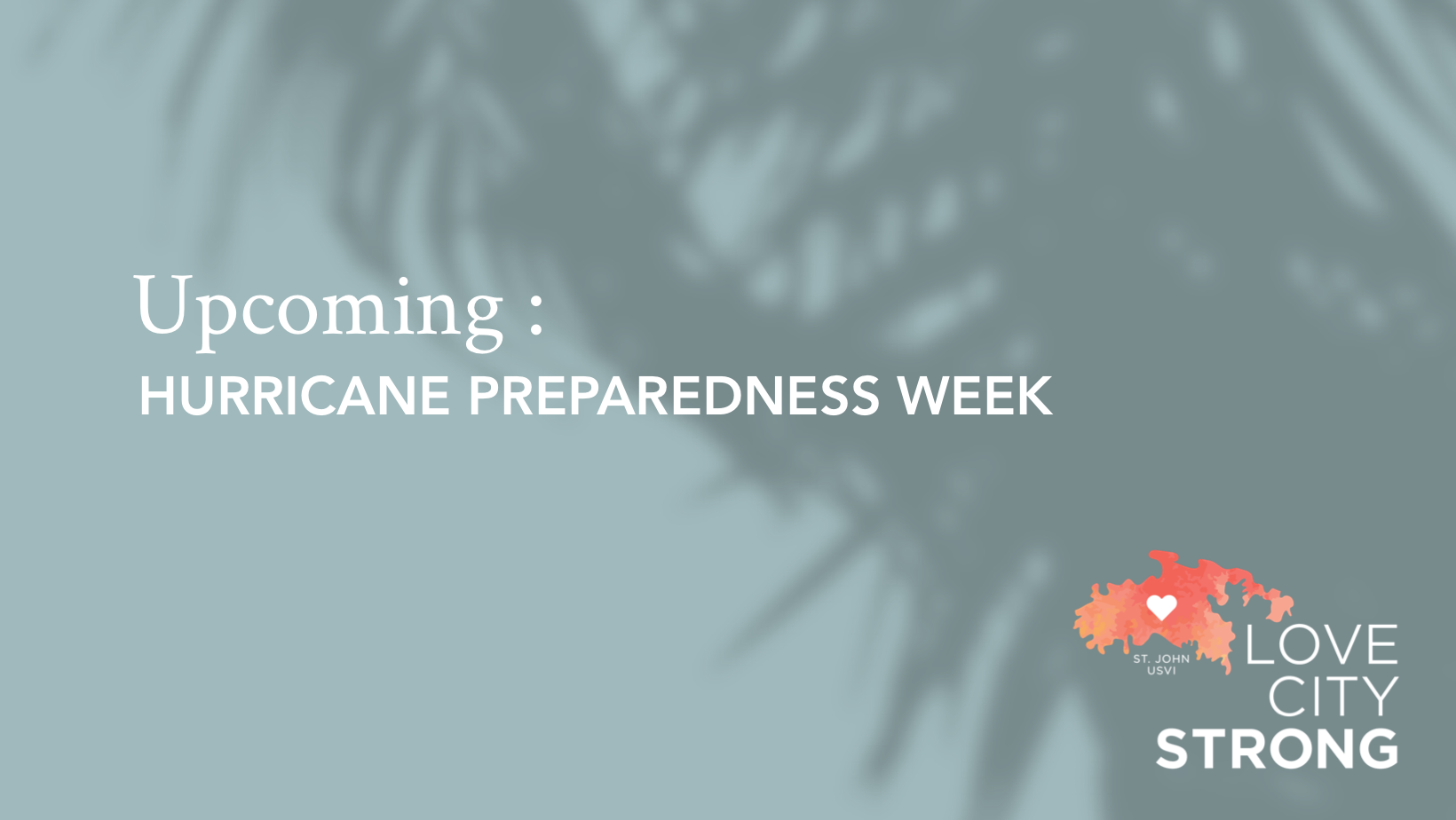
Disaster preparedness is at the very core of Love City Strong’s mission. Importantly, each May we highlight Hurricane Preparedness Week – this year, from May 9th through 15th. The week serves as a perfect time to assess your personal hurricane risk and preparedness. Predictions indicate an above average activity level this season but clearly, it only takes one storm to change your community.
Before hurricane season begins on June 1st, you should begin doing the following things:
- Determine your risk
- Develop your sheltering or evacuation plan.
- Assemble disaster supplies, or “Build A Kit” as Ready.gov says!
- Get an insurance check up
- Strengthen your home
- Help your neighbors
- Complete a written plan

This week, our team partnered with the Virgin Islands Fire Department and Our Lady of Mt. Carmel Catholic Church to help distribute boxes of food to St. John residents as part of the USDA’s Farmers to Families program.
While this is the fourth time that boxes of food have been given out on St. John, the current distribution model relies on those in need going to distribution sites.
Our team’s inclusion in this round of distribution ensured that a crucial group of individuals was able to receive this program’s benefits: Seniors and people with a disability or chronic health condition that renders them homebound. We delivered boxes of food directly to 80 homes across the island in a single day.
Our longstanding model of going directly to those we serve for all of our programs, rather than making them come to us, means that we are uniquely able to navigate St. John quickly and efficiently. This allows us to provide people with goods and services from other organizations who might otherwise not be able to access them.
Thanks to the support of our Board and donors, we are able to provide vehicles for our employees to participate in programs like this. Providing our team with vehicles, PPE, and the tools that they need to do their jobs ensures that they do not have to use their personal property for work purposes. This lends itself to our belief in a strong work-life balance, and strengthens our impact.
Your donations ensure that we can continue to support other organizations’ efforts when we are not working on our own programs. Click here to read more about what we do, and please consider a donation today. With your help, we can keep supporting our community whenever we are able.
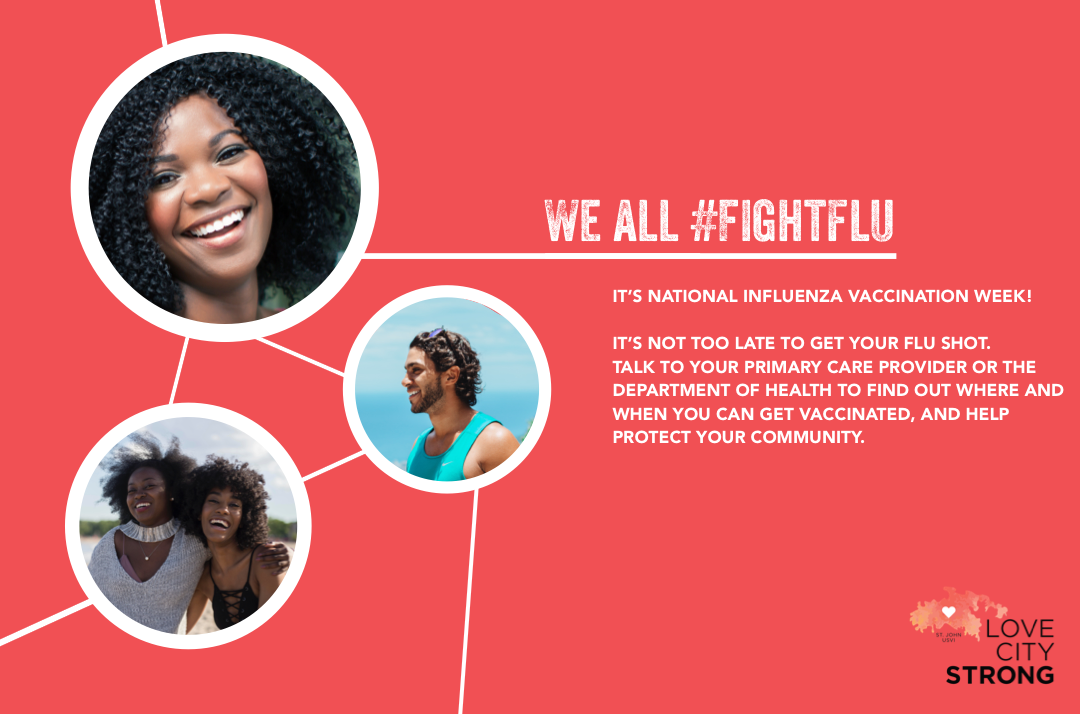
December 7th is the start of National Influenza Vaccination Week (NIVW). NIVW is an annual observance reminding everyone age 6 months and older that there’s still time to get vaccinated and #FightFlu in your community.
Flu vaccinations are more critical than ever this year as COVID-19 continues to spread at alarming rates. Combating both viruses has already placed a tremendous burden on healthcare systems around the globe. This may result in many more illnesses, hospitalizations and deaths than during a typical flu season.
Even for those who are young, healthy, and have no preexisting conditions, getting a flu vaccine is still important. By getting vaccinated we prevent ourselves from becoming vectors of disease and causing undue harm to others.
The CDC estimates that flu vaccinations in the U.S. reduce the risk of illness for 40-60% of the overall population. In other words, the more people who vaccinate in a community, the more that their community is protected.
Do your part to protect your community by getting your annual flu vaccination. Flu vaccinations are a simple act that has the potential to save lives, support our healthcare workers, and make a real difference.
Visit www.GetMyFluShot.org to learn more.
For a partial list of vaccination providers in your area, click here.
To learn more about the similarities and differences between the influenza virus and COVID-19, check out this video from Johns Hopkins Medicine.

The Territory entered the 2020 hurricane season on high alert, facing the forecast of an active season paired with the COVID-19 pandemic. At Love City Strong, we began modifying and updating our preparedness and response plans early on, reaching out to our partners at Virgin Islands Territorial Emergency Management Agency (VITEMA), the Virgin Islands Department of Health (VIDOH), the Virgin Islands Department of Human Services, and the Centers for Disease Control (CDC) for guidance and best practices for responding to a disaster during a global health crisis.
Thanks to our work responding to the pandemic on St. John, our team was already used to wearing personal protective equipment (PPE) and adhering to social distancing protocols. We modified our annual community outreach programs, becoming less reliant on public events and leveraging public and private partnerships in order to successfully respond to two significant weather events while keeping residents informed.
Tropical Storm Isaias impacted the Territory on July 29th, and our response lasted from July 25th through July 30th. This large system moved quickly, but did not turn into a tropical storm until it passed just south of St Croix. Our team remained on alert and executed pre- and post-storm wellness checks in the community, shifting from at-home visits to conducting them entirely over the phone. We assisted residents with downed trees and minor storm debris on their property, and brought resources like solar powered lights to those experiencing power loss.
A wave of severe weather associated with Tropical Storm Laura impacted the Territory in the early morning hours of Saturday, August 21st. Once again, what was expected to be a significant rain event stayed to our south, resulting in a limited impact. Within 24 hours of the forecast impact, we knew that the path would keep Laura from being much of a threat to the USVI, but our team continued to execute pre- storm wellness checks, and helped several residents with boarding up and clearing their property.
This hurricane season saw us working closely with VITEMA and our other government partners, as well as our sister nonprofits affiliated with Virgin Islands Voluntary Organizations Active in Disaster (VI VOAD), to keep St. John prepared. Between storms this year, we delivered sandbags to over 100 households, and handed out blue roofing via a drive-through system alongside our partners. Both of these events would normally be done in the form of large public gatherings, but we were able to execute them successfully while still observing social distancing and PPE use.
The 2020 hurricane season taught us much about the unpredictable nature of disaster preparedness, and emphasized the complex relationship between multiple disasters that share the same impact window. I am proud of the work our team has done this year, in the face of so many challenges. As the season comes to a close, we look forward to further refining our deployment plans, expanding our preparedness and resilience programming, and serving the community in the years to come.
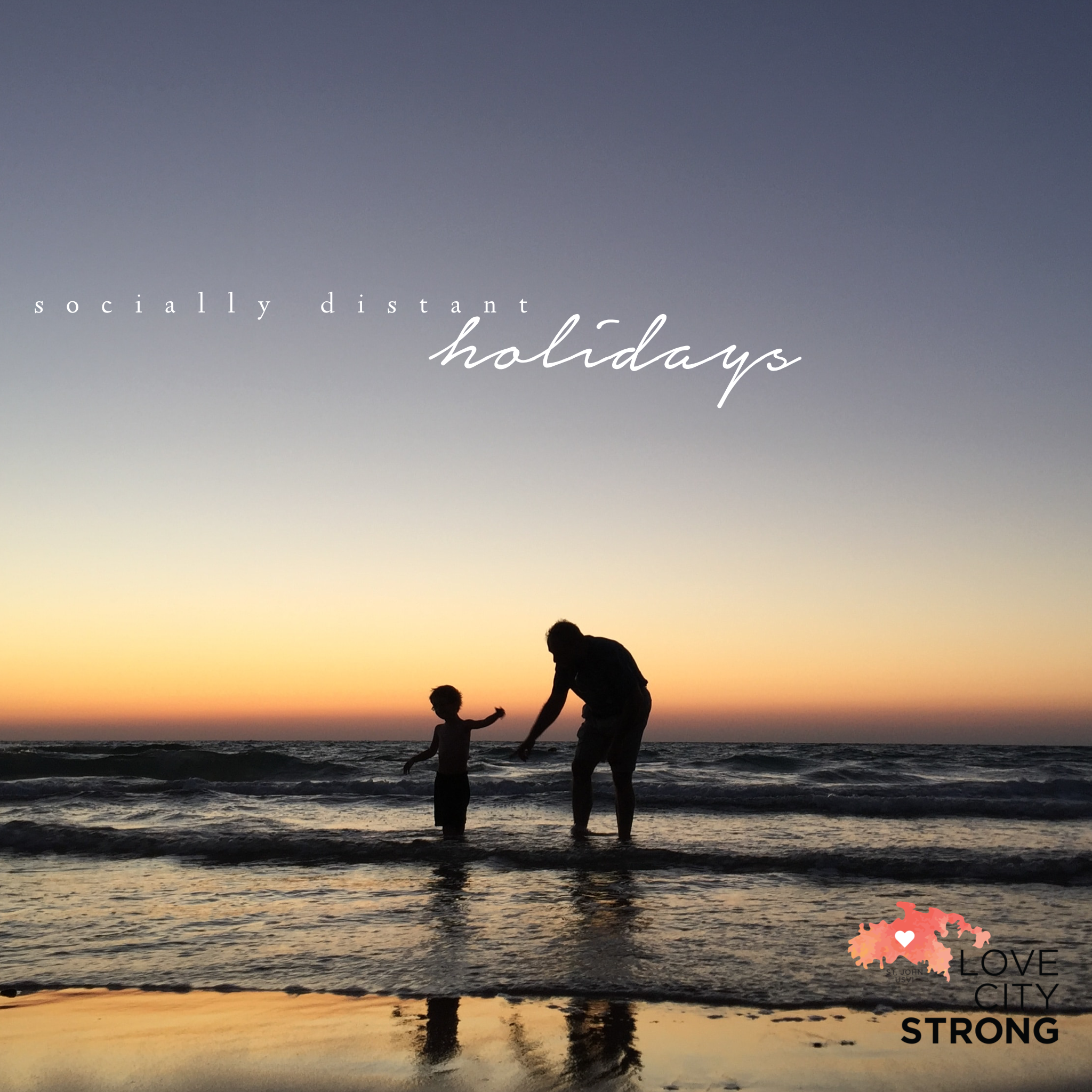
Almost a year into the COVID-19 pandemic, it’s understandable that many are starting to develop a sense of emotional burnout that some are calling “covid fatigue.”
The sense of a never ending struggle against an invisible threat may cause people to let their guard down. After all, it can feel wrong to continue to rearrange your life and practice all of these new habits if your risk seems nonexistent. However, this behavior is precisely what leads to surges in COVID-19 cases.
As cases begin to increase globally, particularly in the United States, anecdotal evidence suggests that “covid fatigue” is playing a major part. People are tired of not seeing their loved ones, and staying socially distant, and making dramatic shifts in how they interact with the world.
What’s troubling is that this societal shift is about to converge with the holiday season; a time when people around the world come together with loved ones and celebrate long standing traditions with their communities. These celebrations usually occur indoors, in large groups, and almost always involve older members of one’s extended family or community.
Given that most of us have not seen our loved ones this year due to the pandemic, it can be tempting to completely relax our habits for the holidays and to act as though we live in a world free of risk. The sense of comfort and nostalgia that the holidays give us seem like the perfect solution to our pandemic woes. Unfortunately, the traditions that many of us crave are exactly the kinds of scenarios that put us and others at risk.
It is more important than ever that we begin to workshop creative solutions and start new traditions in order to celebrate the holidays during the pandemic. Whether gathering in smaller groups with immediate members of your household only, taking more time off of work or school to allow for adequate quarantine on either side of holiday travel, or making celebrations entirely virtual, any amount of mitigation will be better than none.
Here are a few key questions to consider when making holiday plans this year:
- What risk are you placing on others (particularly seniors or those who are immunocompromised) with the celebrations that you are planning?
- How can you modify your normal plans to allow for social distancing, or even to have events outdoors rather than indoors?
- For those traveling, what is the status of the virus in your community, and the community that you’re traveling to? Is it fair to put a strain on another community’s healthcare system, or put loved ones in another community at risk, for the sake of not celebrating the holidays in your own community?
- Do you have the resources and time to get tested and self-isolate before celebrating the holidays with people you do not live with?
- Should you set boundaries and expectations with others (and avoid those awkward conversations about why you won’t be hugging anyone this year) ahead of time?
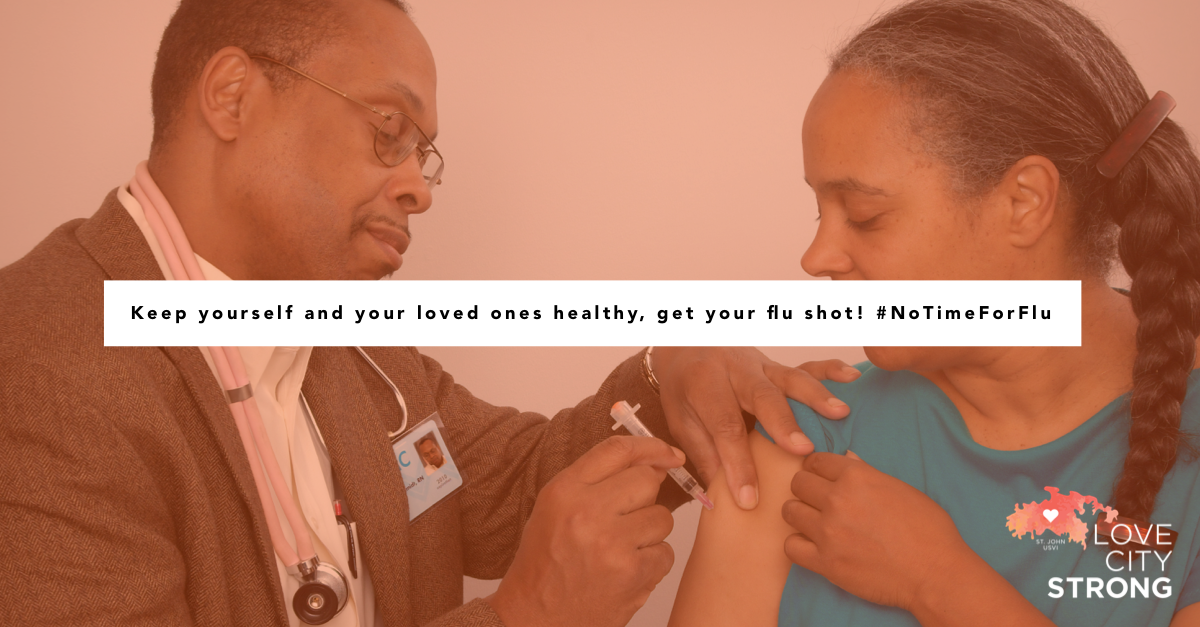
Healthcare professionals around the globe are gearing up to fight two deadly threats simultaneously: COVID-19 and the flu. Seasonal flu viruses are dynamic, and their health risks and severity vary year to year.
However, the flu virus is one of the leading causes of death in the United States. With high risk populations already ravaged by COVID-19 this year, it is more important than ever that as many people get vaccinated for the flu as possible.
Even for those who are young, healthy, and have no preexisting conditions, getting a flu vaccine is important. By getting vaccinated, we prevent ourselves from becoming vectors of disease and causing undue harm to others. The CDC estimates that flu vaccinations in the U.S. reduce the risk of illness for 40-60% of the overall population; the more people who vaccinate in a community, the more that a community is protected.
While it is true that there is overlap between mitigation measures which help prevent the transmission of COVID-19 and influenza (washing hands frequently, sanitizing surfaces, wearing a mask, and staying away from others if you feel sick), practicing these habits may not be enough to help healthcare providers combat two viruses simultaneously during the 2020/2021 flu season.
Although last year’s final flu season numbers are not yet available, preliminary CDC data shows that between 39 and 56 million Americans contracted the flu last year, with over 400 thousand hospitalizations nation-wide. With COVID-19 pushing PPE supplies and hospital capacity to the breaking point, a serious flu season could cause local healthcare systems to utterly collapse. Limiting the burden on our healthcare systems and healthcare workers in any way that we can is critical.
During this time of uncertainty, it is incumbent on each of us to do our part to protect our communities. Think of getting your flu shot not as a chore, but as an act of civic responsibility. Flu vaccinations are a simple action that has the potential to save lives, support our healthcare workers, and make a real difference.
Visit www.GetMyFluShot.org to learn more.
For a partial list of vaccination providers in your area, click here.
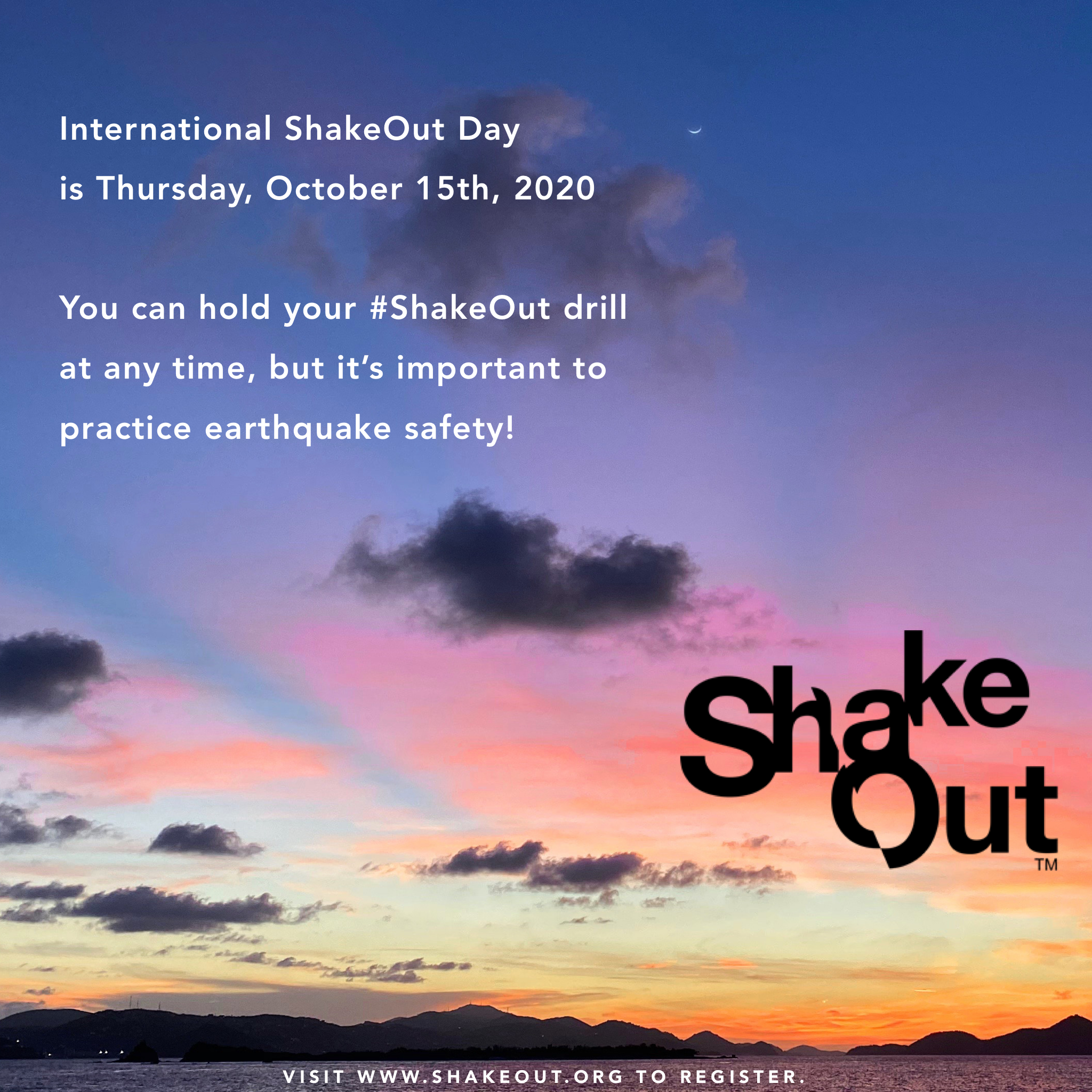
The Caribbean region is at risk to a variety of natural disasters, from hurricanes to tsunamis to severe droughts and heat waves. However, there is one natural disaster that is often overlooked in preparedness conversations, yet has the potential to be the most catastrophic.
Puerto Rico and the Virgin Islands are located at an active plate boundary between the North American plate and the northeast corner of the Caribbean plate. Plate movements have caused large magnitude earthquakes and devastating tsunamis over the years, and this has certainly been the case in 2020.
Throughout January 2020, Puerto Rico was barraged by a swarm of quakes, 11 of which were a magnitude of 5 or greater. The resulting loss of life, devastation to infrastructure, and long term economic impacts cannot be overstated.
As with any natural disaster, the work of community organizations to prepare and respond must also be augmented by citizen preparedness. After all, the more prepared that the average individual is, the more time that community organizations can spend helping those disaster survivors who need it the most.
To that end, this year we encourage everyone to participate in the International Great Shake Out event (www.ShakeOut.org) this week on Thursday, October 15th!
Participation in this event can be as involved as visiting their website, registering, and uploading a video of you and your loved ones performing an earthquake safety drill; or as simple as making the time to talk about earthquake preparedness with those in your household. The important thing is recognizing that earthquakes pose a serious threat, and incorporating preparedness for earthquakes into your regular readiness activities as a household or business.
Even if you do not participate in the Great Shake Out itself, take the time to learn about earthquakes, consider what effects they may have on your surroundings, and make a plan to keep yourself safe both during and after a quake. As with any natural disaster, the only “right time” to prepare is as soon and as often as possible!
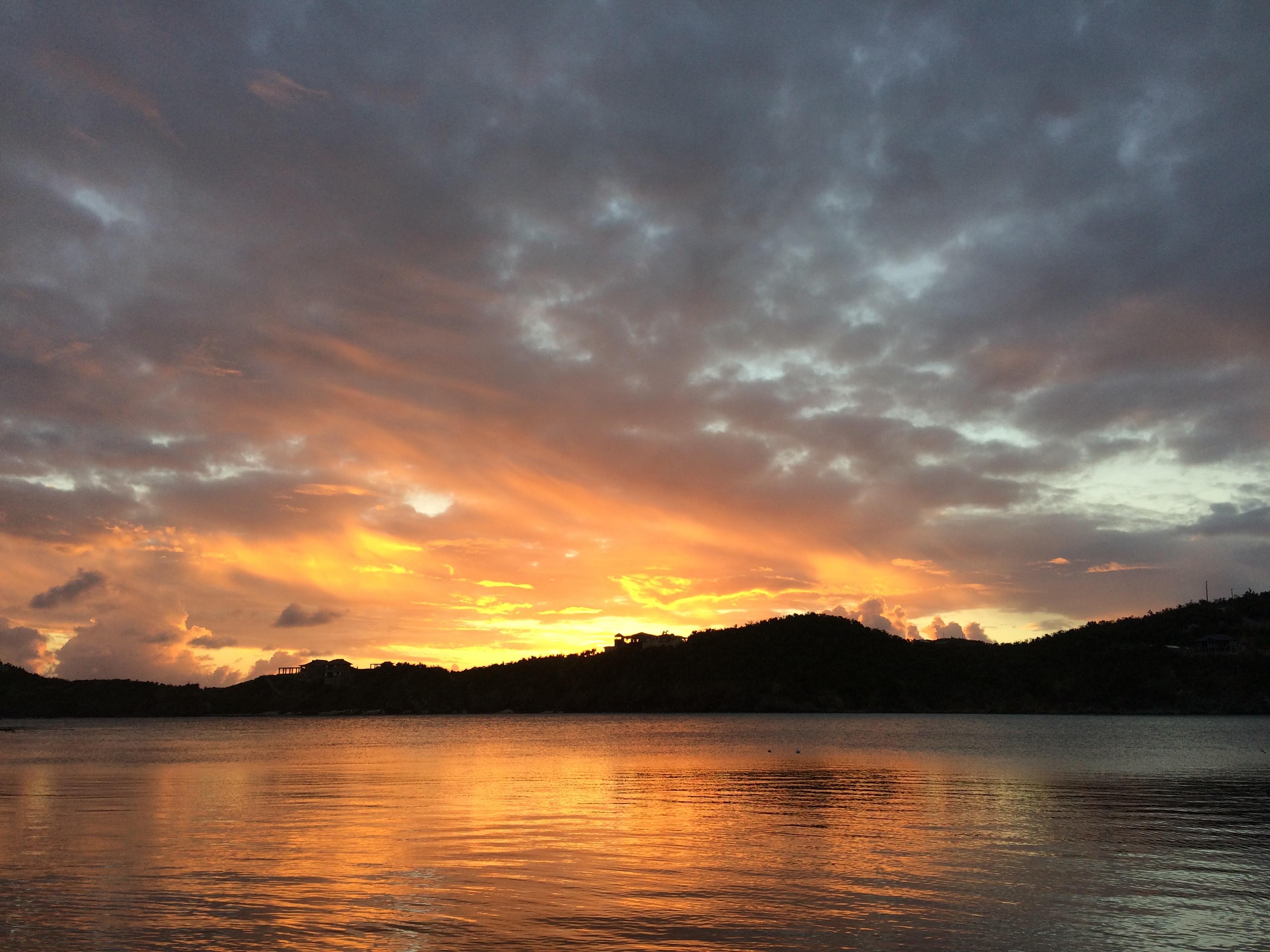
The Atlantic Hurricane Season triggers countless emotions for many Virgin Islanders and residents of the VI. This is not only a time when we are busy preparing for the possibilities of storms; it is also a time of year that we tend to remember the one storm that changed the course of so many lives.
On September 6, 2017 Hurricane Irma cut a path of destruction through the Caribbean basin, impacting the lives of millions. With record high wind speeds of 185 miles per hour, Irma was one of the deadliest and to date the strongest storm on record in the Atlantic region. St. John was utterly devastated; the island experienced widespread destruction to its structures, roads, critical infrastructure and widespread power loss.
13 days later, Hurricane Maria followed, and delivered a second, crushing blow. St. John received over 3 feet of rain in under 24 hours, and response efforts made by our sister islands were forced to halt completely. Maria was the tenth-most intense Atlantic hurricane on record, with peak winds of 175mph.
To say that such unprecedented natural disasters changed the reality of everyday life in the Virgin Islands would be an understatement. The team at Love City Strong suffered our share of losses due to the storms of 2017. Many of us lost our homes or our jobs, and some of us endured even greater personal hardships.
However, just as our shared experiences as survivors of natural disasters are what brought us together, it is our collective passion for preparedness that keeps us motivated and helps us to get through this difficult time of year. It is fitting, then, that the anniversary of Hurricanes Irma and Maria falls during National Preparedness Month—A time to ensure that the impact of natural disasters is reduced through meaningful action.
For LCS, meaningful action means implementing strategies that worked after Hurricanes Irma and Maria in a more organized fashion, and ensuring that response assets are prestaged on the island and ready to be deployed at a moment’s notice.
Each year, we deploy 25 seasonal employees who are on standby from July through November; they are trained in a variety of safety, first aid, and professional first responder protocols. Part of this team are trained to remove debris from secondary roadways. All members of this team are Virgin Islanders or longtime residents who have lived on St. John for no less than five years, and they are from a variety of backgrounds and age ranges to better reflect the diversity of the community.
We maintain a variety of response assets, including large commercial generators and several pieces of heavy equipment, that we can provide to essential businesses should the need arise. We facilitate the permanent storage of FEMA assets on St. John, including shelf sustainable water and MREs, to ensure that we do not need to wait for commodities to be transported from another island. We also coordinate with the Virgin Islands Territorial Emergency Management Agency (VITEMA) to assist them in their hurricane readiness efforts, like distributing sandbags and blue roof materials.
We perform pre-event and post-event wellness checks on hundreds of residents every single time that a storm is headed our way, regardless of its size, and assist seniors and persons with access and functional needs in their preparedness efforts.
Though our preparedness priorities shift as we face new and dynamic challenges like the COVID-19 pandemic, our core mission remains the same: Take meaningful action and utilize the human resources present in the community to ensure that St. John is better prepared for disasters. While we will never forget the traumatic experience of the 2017 hurricanes that brought us together, we have a collective commitment to being part of a stronger, more prepared community. The passion that guided our actions immediately following Irma and Maria continues to drive us in our constantly evolving preparedness and response programs.
